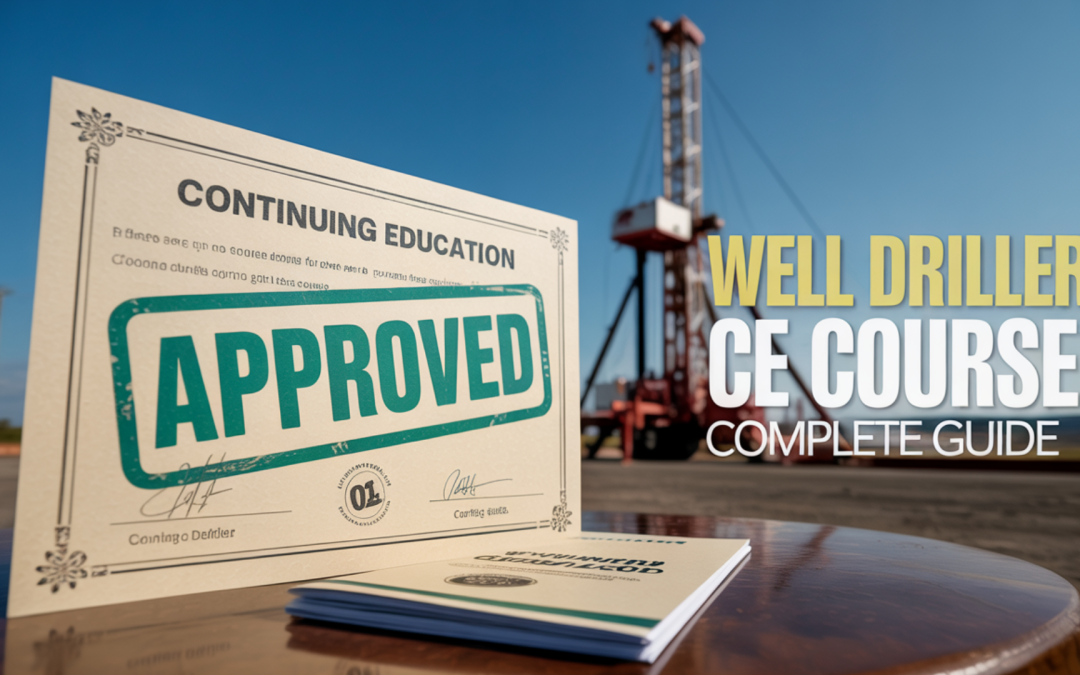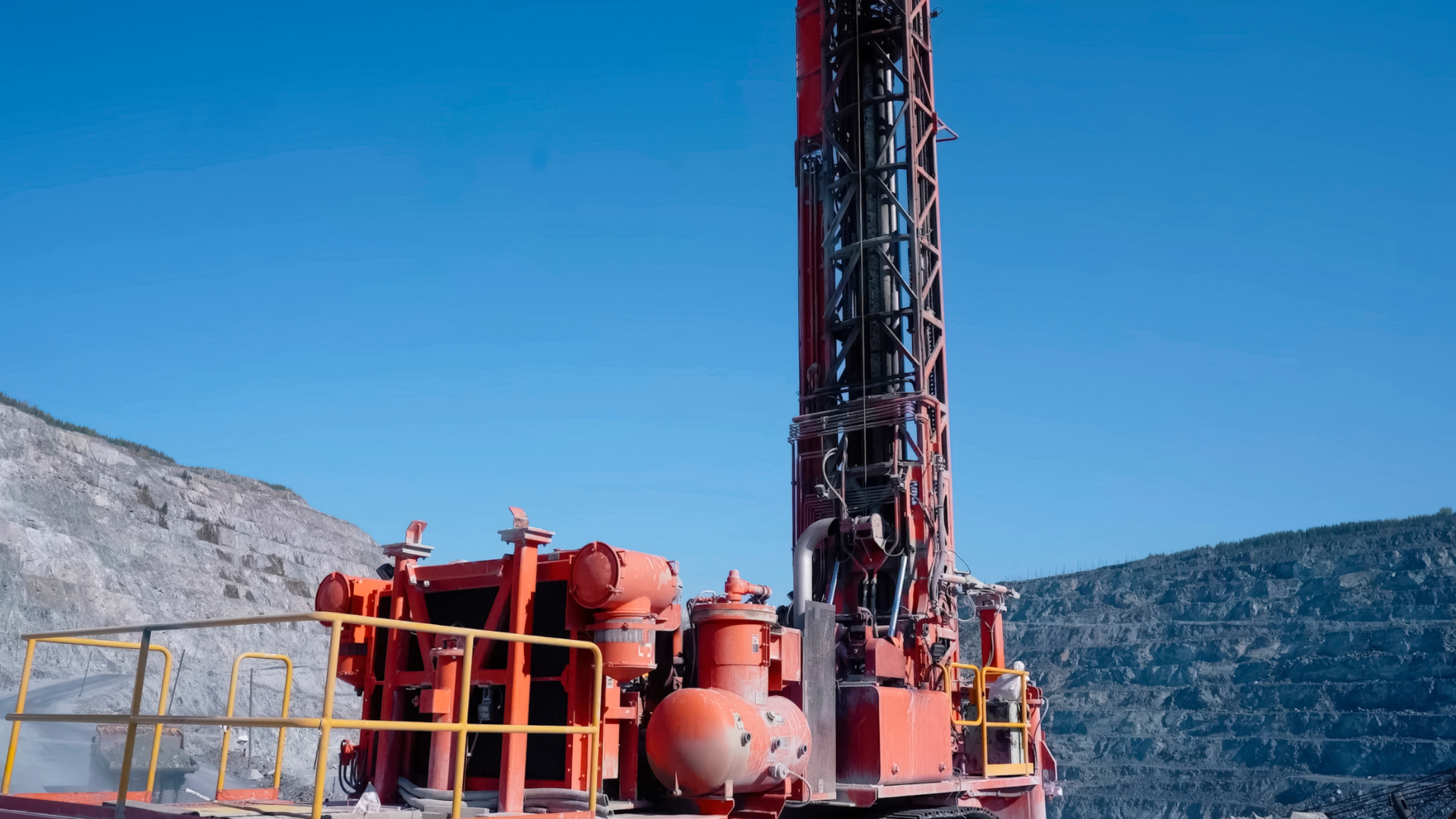Renewing a well driller license requires more than meeting deadlines; it demands staying current with industry practices, safety standards, and state regulations. A well-driller continuing education course delivers the specialized training needed to keep skills sharp and credentials valid. With online options, professionals can meet requirements efficiently, learning at their own pace without interrupting daily operations. This blog explains how an online program streamlines compliance, supports career growth, and equips drillers with the latest technical knowledge and best practices.
Key Takeaways
- Well driller continuing education is vital for skill enhancement and compliance with state regulations, ensuring professionals remain updated on industry practices.
- Online courses offer flexibility, cost-effectiveness, and efficiency, enabling well drillers to balance education with their work schedules while covering a broad range of topics.
- State-specific requirements for continuing education vary, emphasizing the necessity for well drillers to understand local regulations to maintain their licensing and enhance career prospects.
Understanding Well Driller Continuing Education
Continuing education for well drillers and pump installers is designed to refine skills, expand knowledge, and ensure compliance with local regulations. It is an essential aspect of professional well development, as it keeps drillers abreast of the latest industry practices and technological advancements. This ongoing learning process not only enhances the competency of well drillers but also ensures that they are equipped to handle the complexities of modern well drilling operations.
State-approved CE courses ensure that the training meets specific regulatory requirements. Licensed well drillers are responsible for verifying that their chosen courses are state-approved to maintain their licensure. This rigorous approval process guarantees that the education provided is relevant and up-to-date, ultimately benefiting both the professionals and the communities they serve.
Anyone planning a career in well drilling should start with the tips on how to become a water well driller in Texas, which outline everything from meeting education requirements to gaining hands-on experience and completing the state’s licensing process. These steps create a strong foundation for long-term professional growth.
Benefits of Online Continuing Education Courses
One of the most significant advantages of online continuing education courses is the unparalleled flexibility they offer. Participants can complete courses from the comfort of their homes without disrupting their work schedules. Many well drillers appreciate the ability to study at their convenience, whether late at night or during weekends, making it easier to balance education with other responsibilities.
Cost-effectiveness is another notable benefit of online continuing education courses:
- Courses in Texas start as low as $14.95, making them accessible to a broad range of professionals.
- Online courses often cover a wider array of topics compared to traditional in-person seminars.
- This broader coverage provides drillers with comprehensive knowledge that can be directly applied to their work.
- It ensures that well drillers remain well-informed about various aspects of their profession.
Moreover, the efficiency of online education cannot be overlooked. Many professionals have found that completing their continuing education requirements online is more efficient, reducing the need for travel and time away from job sites. The satisfaction among drillers who choose online education underscores its effectiveness in meeting their professional development needs.
State Requirements for Well Driller Continuing Education
State requirements for well driller continuing education vary significantly, necessitating a clear understanding of local regulations. In Florida, the Department of Environmental Protection is responsible for approving continuing education classes for well-drilling professionals. This ensures that the courses meet the state’s stringent standards and provide relevant, up-to-date information.
Before beginning the process, it’s crucial to understand whether a license is required to drill water wells in Texas. Knowing the licensing rules and the continuing education and compliance standards ensures that every drilling project meets the state’s legal and safety requirements.
The reporting process and deadlines are crucial aspects of compliance:
- Course completion is typically reported to the state on the next business day, ensuring timely updates to professional records.
- The application deadline for course approval is usually 60 days before the course is offered.
- Well drillers must complete a minimum of eight credit hours during each two-year period to maintain their licensure.
A report is essential for tracking compliance. Reports are also necessary for ensuring adherence to regulations.
How to Choose the Right Continuing Education Provider
Selecting the right continuing education provider is a critical step in ensuring a positive and productive learning experience. Providers offer user-friendly courses that prioritize student satisfaction and support, especially for those who are pre-approved. User reviews and testimonials can provide valuable insights into the effectiveness and quality of the courses offered.
Support is another crucial factor to consider. Having readily available assistance can enhance the overall experience, helping to resolve any issues quickly and efficiently. Please take note of this concern.
Choosing a reputable provider guarantees high-quality education that meets state requirements and supports professional growth.
Course Structure and Content
Continuing education courses for well drillers cover a broad range of essential topics, including safety, technical skills, and business management. These courses are designed to enhance overall competency and ensure that water well drillers are well-prepared for the challenges of their profession. Topics such as borehole geophysics, common well failures, and groundwater influence are commonly included to provide a comprehensive understanding of well drilling at the School of Well Drilling.
Accessibility and user-friendliness are key features of online courses. Participants can access their courses on various devices, facilitating flexible learning. This flexibility allows drillers to study at their convenience, fitting education around their work schedules. The user-friendly design of these courses ensures that learners can easily navigate the material and stay engaged, as the content is accessed with ease.
Interactive elements, such as quizzes, are often incorporated to reinforce learning and engagement. These tools help ensure that participants retain the information and can apply it effectively in their work. By offering a well-rounded educational experience, these forms of courses support the professional development of well drillers.
Registering for an Online Course
Registering for an online continuing education course is a straightforward process:
- Select a course from the available list and click the ‘Access Course’ button.
- After choosing your course, click the ‘Purchase’ button to create an account and complete the transaction.
- If you do not have a license number, enter ‘Applicant’ in the designated space during registration.
This user-friendly registration process ensures that well drillers can quickly and easily enroll in the courses they need to fulfill their continuing education requirements. Simplifying the registration process makes it easier for professionals to access high-quality training and stay compliant with drilling regulations.
Completing Your Course at Your Own Pace
One of the greatest advantages of online continuing education courses is the ability to complete them at your own pace in a self-paced manner. Participants can customize their learning schedules to fit their routines, allowing for flexibility in course engagement. This flexibility is particularly beneficial for well drillers who must balance their education with demanding work schedules, especially when seeking continuing education credit. Additionally, a continuing education program can provide the necessary resources to enhance their skills.
Effective time management techniques can help learners prioritize tasks, set goals, and stay committed to completing their courses. Online formats often include tools and resources that assist in managing one’s time effectively throughout the course. Leveraging these tools helps participants meet their educational goals without compromising professional responsibilities.
Receiving Your Certificate of Completion
Upon completing an online continuing education course, participants receive a certificate of completion. If the certificate is not received immediately, it may take up to 24 hours for processing. This certificate is crucial for demonstrating that the well driller has fulfilled their continuing education requirements and is eligible for license renewal, including the necessary continuing education units and continuing education hours.
In case the certificate is not received, individuals can request a duplicate by providing specific details like the course name and completion date. This ensures that participants have proof of their completed education, which is necessary for maintaining their professional licensure.
Renewing Your Well Driller License
Renewing a well driller license requires adherence to specific continuing education requirements. For a one-year license, drillers must complete four hours of continuing education, including one hour focused on relevant statutes and rules. A two-year license requires eight hours of continuing education, with a similar focus on pertinent statutes and rules before the next renewal.
Accredited providers will issue a certificate upon course completion, which is necessary for license renewal. Renewal notifications are typically mailed 60 days before the license expiration, and it is the licensee’s responsibility to ensure renewal before the deadline.
If a license has expired for less than 90 days, it can be renewed with a fee equal to one and a half times the standard renewal fee. For licenses that have expired for more than 90 days but less than 18 months, the renewal fee is twice the normal amount. Ensuring timely renewal is crucial for maintaining active licensure and continuing to practice legally.
Technological Advances in Well Drilling
Staying updated with technological advances is crucial for well drillers. Continuing education helps professionals stay informed about new technologies and regulatory changes in the field. Engaging course content allows drillers to acquire skills that can be immediately applied in their jobs, enhancing their overall competency.
Innovations like COREFROST™ thermal fluids and Hydratech’s Thermox DTX® offer superior thermal conductivity and lower viscosity, optimizing geothermal heating pump systems and reducing environmental impact. Staying abreast of such technological advances improves efficiency and effectiveness in the field.
Testimonials and Success Stories
Many professionals have reported that completing the online well driller continuing education course significantly enhanced their knowledge and skills in the field. The flexibility of online education allows them to balance their studies with work and personal commitments, making it a preferred choice for many.
Numerous success stories illustrate how past participants achieved promotions or new opportunities in the well-drilling industry after completing the course. These testimonials underscore the value of enrolling in the online well driller continuing education course for anyone looking to advance their career and improve their skills, including drillers and pump installers, while gaining valuable drilling experience.
Final Thoughts
Continuing education is a critical investment in every well driller’s professional journey. It keeps skills sharp, supports compliance with evolving state regulations, and provides insight into emerging technologies. With self-paced online programs, professionals can complete required credits efficiently, manage demanding schedules, and advance their careers without compromising work commitments.
For Texas professionals, State-Approved Continuing Education makes this process straightforward with its Texas water well driller continuing education course. The program delivers state-approved, self-paced modules covering safety, groundwater management, and regulatory updates. By enrolling through State Approved, drillers gain reliable reporting to the Texas Department of Licensing and Regulation, quick certificate processing, and 24/7 access, ensuring seamless license renewal and continuous professional growth.
Frequently Asked Questions
What type of courses does the Texas Continuing Education offer?
Texas Continuing Education offers a variety of courses for professionals such as Cosmetologists, Electricians, HVAC/ACR specialists, Auctioneers, Well Drillers, Pump Installers, Tow Truck Drivers, Tow Truck Operators, and Property Tax Consultants. This range of options caters to various fields, ensuring that professionals can meet their continuing education needs effectively.
Are there any tests required for the Texas CE courses?
No tests are required for the Texas CE courses. You can complete the courses without the need for any examinations.
What is the flexibility of the Texas CE courses?
The Texas CE courses offer significant flexibility as they are self-paced, enabling learners to log in and complete the coursework at their convenience. This structure allows for optimal time management and learning according to individual schedules.
How are the Texas CE courses delivered?
Texas CE courses are predominantly delivered online, enabling completion from home or on mobile devices. This flexibility ensures that you can fit your learning into your schedule conveniently.
What is the starting price for the continuing education courses in Texas?
The starting price for continuing education courses in Texas is as low as $14.95.



